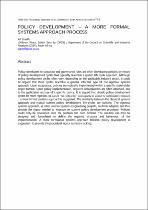JavaScript is disabled for your browser. Some features of this site may not work without it.
- ResearchSpace
- →
- Research Publications/Outputs
- →
- Conference Publications
- →
- View Item
| dc.contributor.author |
Greeff, AP

|
|
| dc.date.accessioned | 2015-03-12T10:22:39Z | |
| dc.date.available | 2015-03-12T10:22:39Z | |
| dc.date.issued | 2011-09 | |
| dc.identifier.citation | Greeff, A.P. 2011. Policy development: a more formal systems approach process. In: International Conference on Industrial Engineering, Systems Engineering and Engineering Management for Sustainable Global Development, Stellenbosch, South Africa, 21-23 September 2011 | en_US |
| dc.identifier.uri | http://www.isem.org.za/index.php/isem/isem2011/paper/view/77/47 | |
| dc.identifier.uri | http://hdl.handle.net/10204/7951 | |
| dc.description | Due to copyright restrictions, the attached PDF file only contains the abstract of the full text item. For access to the full text item, please consult the publisher's website. | en_US |
| dc.description.abstract | Policy developers in corporate and governance roles are often developing policies by means of policy development cycles that typically resemble a system life cycle approach. Although policy development cycles often vary, depending on the applicable industry sector, it could be argued that these cycles resemble a general informal type of non-rigorous systems approach. Upon acceptance, policies are typically implemented within a specific stakeholder target domain. Upon policy implementation, negative consequences are often observed, due to the application and use of a specific policy. It is argued that, should policy development cycles be more rigorous, so-called “un-foreseen” consequences could be sufficiently reduced – a more formal systems approach is suggested. The similarity between the classical systems approach and typical current policy development life-cycles are striking. The rigorous systems approach, as often used in Systems Engineering projects, could be adapted, and thus provide the rigour needed to improve on current policy development processes. Policies could only be developed once the problem has been defined. The solution can then be designed and formulated to define the required structure and behaviour, of the implementation. A more formalised systems approach towards policy development is suggested - to provide the procedural rigour currently lacking. | en_US |
| dc.language.iso | en | en_US |
| dc.relation.ispartofseries | Workflow;8689 | |
| dc.subject | Systems engineering | en_US |
| dc.subject | System life cycle approach | en_US |
| dc.subject | Policy development | en_US |
| dc.title | Policy development: a more formal systems approach process | en_US |
| dc.type | Conference Presentation | en_US |
| dc.identifier.apacitation | Greeff, A. (2011). Policy development: a more formal systems approach process. http://hdl.handle.net/10204/7951 | en_ZA |
| dc.identifier.chicagocitation | Greeff, AP. "Policy development: a more formal systems approach process." (2011): http://hdl.handle.net/10204/7951 | en_ZA |
| dc.identifier.vancouvercitation | Greeff A, Policy development: a more formal systems approach process; 2011. http://hdl.handle.net/10204/7951 . | en_ZA |
| dc.identifier.ris | TY - Conference Presentation AU - Greeff, AP AB - Policy developers in corporate and governance roles are often developing policies by means of policy development cycles that typically resemble a system life cycle approach. Although policy development cycles often vary, depending on the applicable industry sector, it could be argued that these cycles resemble a general informal type of non-rigorous systems approach. Upon acceptance, policies are typically implemented within a specific stakeholder target domain. Upon policy implementation, negative consequences are often observed, due to the application and use of a specific policy. It is argued that, should policy development cycles be more rigorous, so-called “un-foreseen” consequences could be sufficiently reduced – a more formal systems approach is suggested. The similarity between the classical systems approach and typical current policy development life-cycles are striking. The rigorous systems approach, as often used in Systems Engineering projects, could be adapted, and thus provide the rigour needed to improve on current policy development processes. Policies could only be developed once the problem has been defined. The solution can then be designed and formulated to define the required structure and behaviour, of the implementation. A more formalised systems approach towards policy development is suggested - to provide the procedural rigour currently lacking. DA - 2011-09 DB - ResearchSpace DP - CSIR KW - Systems engineering KW - System life cycle approach KW - Policy development LK - https://researchspace.csir.co.za PY - 2011 T1 - Policy development: a more formal systems approach process TI - Policy development: a more formal systems approach process UR - http://hdl.handle.net/10204/7951 ER - | en_ZA |






